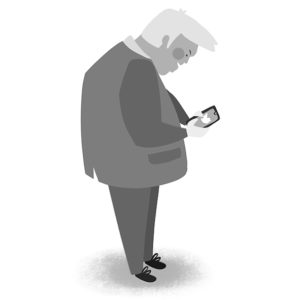
Author: Celia Popovic
- Technology solves everything
- Nothing solves everything - but technology is often held up as a panacea. Those who mentioned this as 'fake news' were particularly concerned with the idea that bad teaching can be fixed if only we find the right gadget. Bad teaching is bad teaching, appropriate technology in the context of a well thought out class can improve student learning.
- Technology equates to innovation
- There is a great deal of emphasis on innovation in Higher Education, particularly in the context of teaching. Putting a lecture online or using a chat room is not by default 'innovative'.
- Lecture recordings cause low attendance
- This is a contested debate. While some instructors may find that when they put their lectures online students stop attending in person, it may not be the fault of the recording as such. If a lecture is purely a one way transmission from lecturer to student and the lecture is available online, why would a student travel to a lecture theatre to hear the same thing? A recording is likely to be more useful as the student can stop and start or replay if necessary. Students will turn up for a lecture in person if it is worth their while. A recording of a lecture that incorporates quizzes, questions, activities will not replicate the in person experience and will not result in lower attendance.
- Nordmann, E., Calder, C., Bishop, P., Irwin, A., Comber, D. (2018) "Turn up, Tune in, Don't drop out: the relationship between lecture attendance, use of lecture recordings and achievement at different levels of study" , Higher Education, online.
- Digital Natives vs Digital Immigrants
- In 2001 Marc Prensky published an article in which he claimed there was a generational divide between those who had grown up in a digital culture and those who had not. The young, were more likely to feel confident with technology while the old were likely to feel the opposite as they had less experience and knowledge of computers and social media. While this notion was popular in the following decade, there are many who argue that the divide is neither accurate nor helpful. There are more reasons than age for a disparity in IT literacy, social groups, access to resources and education can account for many differences. It is dangerous to assume that all young people have a high degree of digital literacy simply because they were born in the last 20 years or so.
- Marc Prensky Digital Natives, Digital Immigrants
- Handwritten notes are better than using a laptop
- A controversy has emerged between those who claim writing notes by hand is better for learning that writing notes on a laptop or phone. The arguments for both sides are inconclusive. Below are some links to papers supporting each side of the debate. There may be insufficient evidence to call this one, but those who doubt that hand written notes are better than notes made on a laptop or phone suggest that the issue may be more to do with the way in which students take notes, rather than the medium used when notes are taken.
- While most of the relevant literature suggests that handwriting is better than typing notes, there may be a confound between what students are doing when they take notes (summarizing, using their own words, writing out what they hear verbatim, etc) and note taking modality – typing vs. writing. That is, there is a higher likelihood of summarizing when taking written notes vs. writing down by hand verbatim what is being said – but this difference should be attributed to note-taking strategy (e.g. summarizing vs. verbatim transcription) vs. actual note-taking modality (e.g. writing vs. typing). Rather than worrying about whether students take notes on a laptop or on paper, we should focus on guiding them on effective note-taking techniques.
- Scientific American - Don't take notes with a laptop
- Psycnet - Note taking with computers: exploring alternative strategies for improved recall
- Lin, L. and Bigenho, C.(2011) Note-taking and memory in different media environments. Computers in the Schools (28.3)
*************************************************************************************************

This work is licensed under a Creative Commons Attribution 4.0 International License.

